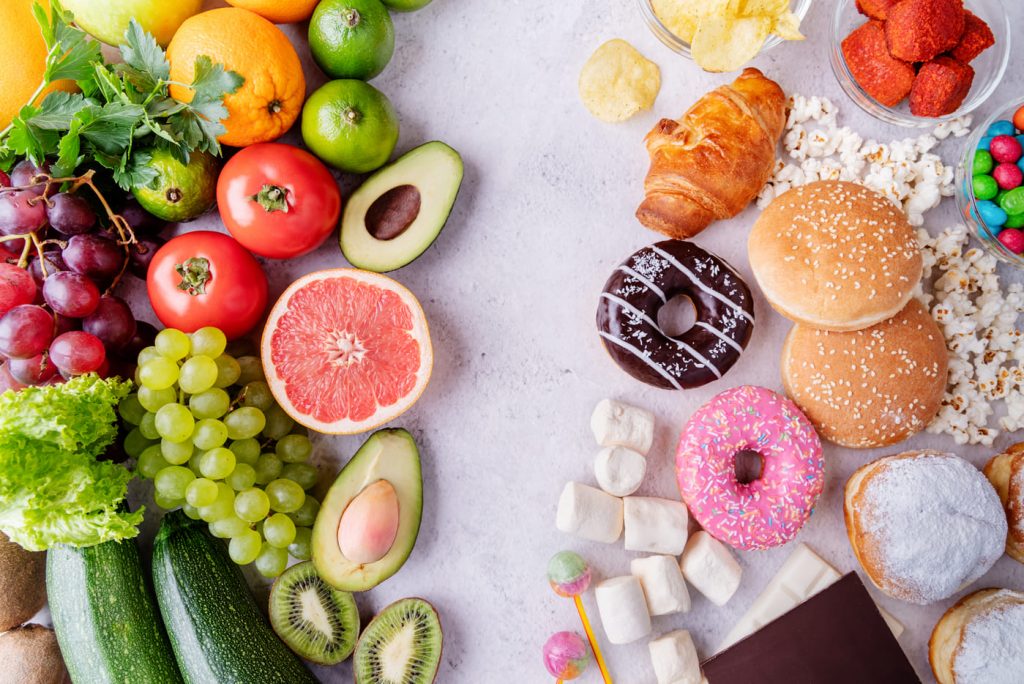How to avoid eating junk food?

There are many reasons why eating junk food is not good for your health.
Junk foods like chips, cakes, biscuits, chocolate, and sugary drinks are highly processed, high in energy and low in nutrients. Unfortunately, these foods and drinks don’t add any value, just lots of added sugar, saturated fat an salt. Junk foods are broadly defined as any processed food, calorically dense with minimal nutritional value, often containing an abundance of added sugar, salt and unhealthy fats – like trans fa. Junk food is cheap to produce, easy to preserve and addicting to eat.
Our society is saturated with snacks and foods, as well as beverages that are relatively inexpensive. These high calorie products that have way too many calories often take the place of more nutritious foods such as vegetables, fruits, whole grains, lean protein and low-fat dairy.
Often, our minds and bodies are overwhelmed with foods that have little nutritional value but are good tasting with a great smell, texture and color that are attractive to our eyes and taste-buds. Occasionally eating junk food is a normal part of life; remember that your health and wellness is a cumulation of all the choices you make and food you eat; so practice self-compassion when you’re trying to kick a craving.

If you’re too hungry, your stomach sends signals to the reward system in your brain that you need to respond to any food cues you see. Try to keep to a regular meal schedule, skip fad diets and include healthy foods and lots of fruits and vegetables in your daily diet.
Before grabbing that last cookie from the lunch room, ask yourself whether you’re actually hungry or thirsty. It’s quite common for people to confuse signs of dehydration for hunger because the feelings of thirst are too subtle compared to those of hunger. Therefore, before biting into that cookie, try drinking a tall glass of water and see if that settles your cravings.
Having sufficient protein in your diet can help you feel fuller, prevent overeating and suppress those cravings. When your appetite is satisfied for a longer period, you’re less likely to reach for something unhealthy.
Becoming aware of the thoughts and feelings we have is half the battle of shifting to a more beneficial mindset. Consciousness or awareness is a powerful tool, simply put it’s the act of being conscious of something or an action.
It’s never too late to develop healthy eating habits, but don’t feel like you have to go all out to start. The unhealthy habits we create to survive or subconsciously create didn’t appear over night so cut yourself some slack and remember this isn’t a race. Trying to do it all at once can be overwhelming, and most of us have gotten used the flavor and addictive qualities of junk food. These foods can be addictive as drugs and alcohol, and they are purposely made that way.
Making a change to your diet is also making a change to your mindset and is ultimately self-care; take it a step further and plan to start a meal routine or pre-planning some meals ahead of time. Free yourself from junk food by creating habits that are sustainable and fuel your lifestyle. Most people make poor food choices when they find themselves out in the world, hungry without a plan and being so hungry that you’re ‘hangry’ is a real thing. By creating a healthy plan and executing on it, you’ll spend your day satiated and less vulnerable to the influence of junk food cravings and advertisements.
Do you get hungry between meals? Try snacking on a piece of fresh fruit or veggie sticks. Identify foods that you enjoy but are lower calorie foods that are also low in fat, salt or sugar. Pick foods you enjoy eating so you don’t end up craving junk foods. Our stomach and brain needs to be satisfied with food consumed at meals and in-between.
You can’t control the world around you but you do have some authority over what you keep in your home. Don’t shoot yourself in the foot with a cupboard full of junk food ready to be cracked open when cravings strike. So set yourself up for success and have fun stocking your pantry and fridge with foods you enjoy that will keep you full and on-track with any health and wellness goals you set.
Addressing your sleep will help you out in a few different ways; not only is the amount of sleep you get important but the quality of sleep matters as well. Not getting enough sleep can increase the amount of perceived stress your body is under and may influence the development of gastrointestinal diseases and inflammation in the body.
